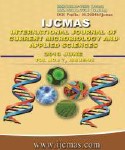


 National Academy of Agricultural Sciences (NAAS)
National Academy of Agricultural Sciences (NAAS)

|
PRINT ISSN : 2319-7692
Online ISSN : 2319-7706 Issues : 12 per year Publisher : Excellent Publishers Email : editorijcmas@gmail.com / submit@ijcmas.com Editor-in-chief: Dr.M.Prakash Index Copernicus ICV 2018: 95.39 NAAS RATING 2020: 5.38 |
Agronomic practices of present era mainly focused on huge production of cereals and other food crops in more sustainable mode for challenging incessantly raising global population. However, rigorous cropping patterns and other environmental factors resulted into reduce micronutrients concentration in crop plants. Large human population relies on such crops for staple food engenders risk of micronutrient deficiency, also narrated as ‘hidden hunger’. Then the strategy of biofortification is a leading solution to counteracting the problems of micronutrient deficiency in various crops. Agronomic, breeding and intervention through biotechnology are main approaches of biofortification for delivering important micronutrients (Zn, Fe, Se and Mn) with increase concentration in various crops, but these approaches are expensive, laborious and slower. However, application of microorganisms represents inexpensive and alternative approach of biofortification with ultimate solution for assisting plants by enhancing their growth with increase micronutrients concentration. Microorganisms have the capacity to solubilize zinc through wide arrays of mechanisms including acidification of nearby soil by organic acid synthesis, productions of siderophore, oxido-reductive system on cell membrane and chelated ligands. Inoculation of microorganisms especially plant growth promoting bacteria, is a better strategy making increase availability of micronutrients in various edible parts of plants. This review is focus to confer an insight on exploiting of microorganisms for increased micronutrient content in plants, using research studies conducted from last few decades to now, and presenting view on using such microorganisms as effective bioinoculant to drive biofortification of food crops in more eco-friendly impendent to improve sustainable agriculture.
 |
 |
 |
 |
 |